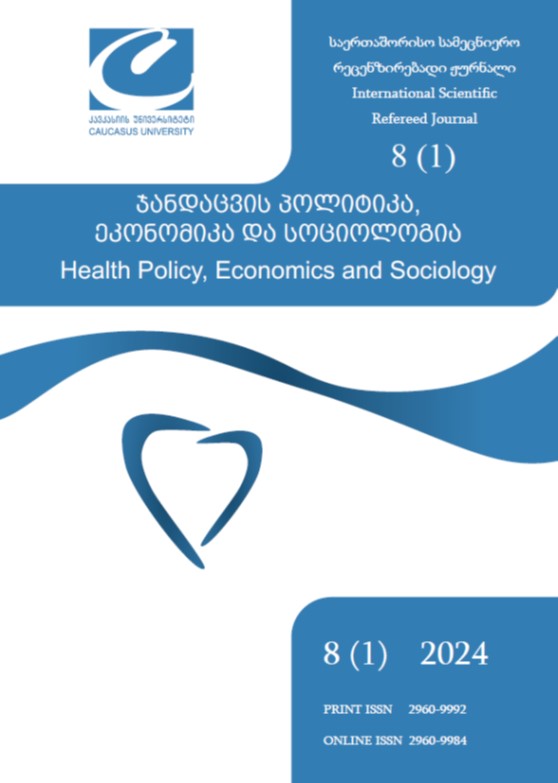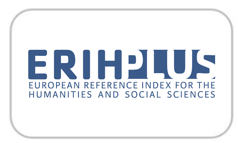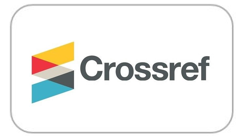სტუდენტთა დამოკიდებულება ჯანსაღი კვების მიმართ და მათი კვებითი ქცევის განმსაზღვრელი ფაქტორები
DOI:
https://doi.org/10.52340/healthecosoc.2024.08.01.01საკვანძო სიტყვები:
კვებითი ქცევა, კვებით ქცევაზე მოქმედი ფაქტორები, ჯანსაღი კვებაანოტაცია
შესავალი: ჯანსაღი კვება, რომელიც გულისხმობს ერთგვარ ბალანსს მიღებულ ცილებს, ჯანსაღ ცხიმებს, ვიტამინებსა და სხვა ნუტრიენტებს შორის, უმნიშვნელოვანეს როლს თამაშობს ადამიანის როგორც ფიზიკურ, ისე - გონებრივ განვითარებაში. ამის საპირისპიროდ კი, არაჯანსაღი კვება, რომელიც ხასიათდება მაღალკალორიულობით, ცხიმიანობით, ვიტამინებისა და მინერალების ნაკლებობით, გრძელვადიან პერსპექტივაში, შესაძლოა ჯანმრთელობის სერიოზული პრობლემების გამომწვევი მიზეზი გახდეს. საქართველოში მოსახლეობის უმრავლესობის კვება არადამაკმაყოფილებელია, არ არის დაბალანსებული და გამოირჩევა მაღალკალორიულობით. შესაბამისად, მოსახლეობის ჯანსაღი კვების უზრუნველყოფა კვლავაც მნიშვნელოვან ამოცანად რჩება. ნაშრომის მიზანია განსაზღვროს სტუდენტების დამოკიდებულება და მათ კვებით ქცევაზე მოქმედი სხვადასხვა ფაქტორი. მეთოდოლოგია: თვისებრივი კვლევის ფარგლებში ჩატარდა კავკასიის უნივერსიტეტის 12 სტუდენტის და 1 ექსპერტის სიღრმისეული ინტერვიუ. რესპონდენტები შერჩეულ იქნა ხელმისაწვდომობიდან გამომდინარე. შედეგები: კვლევის შედეგებმა აჩვენა, რომ სხვადასხვა სოციალური ფაქტორი მნიშვნელოვან როლს ასრულებს ინდივიდის კვებითი ქცევის განსაზღვრაში. დასკვნა: ადრეულ ასაკში ჩამოყალიბებული არასწორი კვებითი ჩვევები, შეზღუდული ფინანსური და დროითი რესურსები ის ფაქტორებია, რომელიც ყველაზე მეტად უშლის ხელს სტუდენტთა ჯანსაღი კვების უზრუნველყოფას და ამავდროულად მნიშვნელოვნად განსაზღვრავს მათ კვებით ქცევას.
წყაროები
Neyman , M., Rodas-Fortier, K., & Silliman , K. (2014). A survey of dietary and exercise habits and perceived barriers to following a healthy lifestyle in a college population. Californian J Health Promot, 2 (2).
Brown, K., McIlveen, H., & Strugnell, C. (2000). Nutritional awareness and food preferences of young consumers. J. Nutr. Food Sci, 30.
Cluskey , M., & Grobe , D. (2009). College weight gain and behavior transitions: male and female differences. Am Diet Assoc, 325-329.
Cockerham, W. (2014). The emerging crisis in american female longevity. Social Currents, 225.
Cockerham, W. C. (2005). Health Lifestyle Theory and the Convergence of Agency and Structure. Journal of Health and Social Behavior, 51-67.
Cockerham, W. C., Rutten, A., & Abel, T. (1997). Conceptualizing contemporary health lifestyles: Moving beyond Weber. Sociological Quarterly, 325.
Contento , I., Williams , S., Franklin , A., & Michela, J. (2006). Understanding the food choice process of adolescents in the context of family and friends. J Adolescent Health, 576.
Crombie , A., Dutton, G., Ilich , J., & Panton, L. (2009). The freshman weight gain phenomenon revisited. Nutr Rev, 67 (2).
Deliens, T., & Clarys, P. (2014). Determinants of eating behaviour in university students: a qualitative study using focus group discussions. BMC Public Health volume , 53.
Deliens, T., Van Hecke , L., & Clarys , P. (2017). Changes in weight and body composition during the first semester at university. A prospective explanatory study. Appetite, 111-116.
El Ansari, W., Stock, C., & Mikolajczyk, R. (2012). Relationships between food consumption and living arrangements among university students in four European countries - a cross-sectional study. Nutr J., 118.
French, S., Jeffery , R., Breitlow , K., & Story, M. (2011). Pricing and promotion effects on low-fat vending snack purchases: the CHIPS study. Am J Public Health, 95.
Harvard University. (2023). The Nutrition Source. Retrieved from Harvard University: https://www.hsph.harvard.edu/nutritionsource/disease-prevention/
LaCaille , L., Dauner , K., Krambeer , R., & Pedersen , J. (2011). Psychosocial and environmental determinants of eating behaviors, physical activity, and weight change among college students: a qualitative analysis. J Am Coll Health, 531-538.
Larson, N., & Story , M. (2017). A review of environmental influences on food choices. Ann Behav Med, 38.
Lê, J., Dallongeville, J., Wagner , A., & Arveiler, D. (2013). Attitudes toward healthy eating: A mediator of the educational level-diet relationship. Eur. J. Clin. Nutr, 67.
MacKinnon , D., & Fairchild, A. (2017). Mediation analysis. Annu Rev Psychol, 569.
Maggini, S., Pierre, A., & Calder, P. C. (2018, Octoner). Immune Function and Micronutrient Requirements Change over the Life Course. Nutrients, pp. 1-27.
Maio, G., & Haddock, G. (2015). The Psychology of Attitudes and Attitude Change. London, UK : 2nd ed. SAGE Publications .
Naughton , P., McCarthy , S., & McCarthy, M. (2015). The creation of a healthy eating motivation score and its association with food choice and physical activity in a cross sectional sample of Irish adults. Int. J. Behav. Nutr. Phys. Act, 74.
Sarris, J., Logan, A. C., Akbaraly, T. N., Amminger, P., & Freeman, M. P. (2015, January). Nutritional medicine as mainstream in psychiatry. Elsevier, pp. 271-274.
Spronk , I., Kullen , C., Burdon , C., & O’Connor, H. (2014). Relationship between nutrition knowledge and dietary intake. Br. J. Nutr. , 111.
Wadolowska , L., Kowalkowska , J., Czarnocinska , J., & Babicz-Zielinska , E. (2017). Comparing dietary patterns derived by two methods and their associations with obesity in Polish girls aged 13–21 years: The cross-sectional GEBaHealth study. Perspect. Public Health, 137.
WHO. (1946, July 22). World Health Organization. Retrieved from Constitution: https://www.who.int/about/governance/constitution
WHO. (2023). World Healt Organization. Retrieved from Nutrition: https://www.who.int/health-topics/nutrition#tab=tab_1
ვერულავა, თ. (2017). ჯანდაცვის სოციოლოგია. თბილისი: ჯანდაცვის პოლიტიკისა და დაზღვევის ცენტრი.
მანჯავიძე, თ. (2016). საქართველოში კვების ეროვნული კვლევა. Oxfam.














